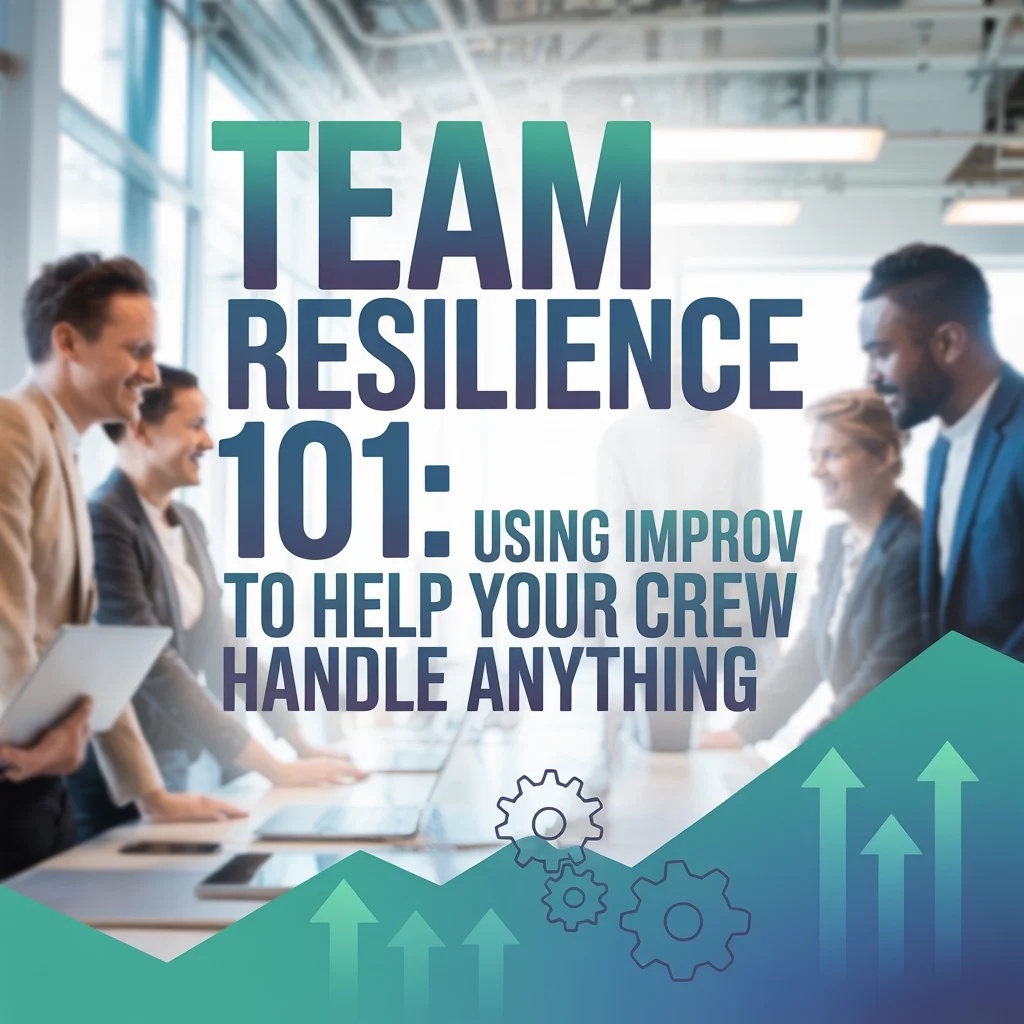Team Resilience 101: Using Improv to Help Your Crew Handle Anything
Whether you’re running a fast-paced office or leading a team remotely across several time zones, one thing’s for sure: work gets bumpy. Change isn’t just a possibility, it’s a guarantee. So how do you future-proof your crew so they don’t just survive, but bounce back from curveballs stronger, wiser, and even closer than before? Welcome to the world of improv.
Improv, once the domain of comedians and performers, is now a powerful tool in the arsenal of Australia’s most resilient workplaces. At Chatterbox Workshops, we see first-hand how these playful, unscripted techniques turn teams into adaptable, creative, and just plain tough units. Here’s a dive into what improv can do for team resilience—and how you can bring the magic to your own crew.
“Yes, And”: The Unsung Hero of Teamwork
At the heart of improv is a deceptively simple phrase: “Yes, and.” It’s not just for laughs—it’s the ultimate move when things go off-script at work.
Saying “yes, and” means accepting what’s happening (even if it’s not what you wanted or expected), then adding your own piece to move things forward. When teams train in “yes, and” thinking, they learn to:
Stay open to change instead of shutting down.
Quickly build on each other’s ideas, even in high-pressure moments.
Move the conversation (and progress) forward, not backward.
It’s the ultimate mindset swap. Instead of resisting changes—a new policy, a surprise client request—your team meets it head-on, collaborates, and adapts together.
Turning Mishaps Into Masterclasses: Reframing Mistakes
Traditional corporate cultures often fear mistakes, making people clam up or hide missteps. Improv turns this on its head.
In improv, every “mistake” is a launchpad for something new. Missed a cue? Stumbled over your punchline? The scene keeps moving. Instead of freezing or pointing fingers, laughter—and learning—kick in.
How does this translate to building a resilient team?
Celebrate learning moments: Try starting meetings with a quick round of “Biggest Faceplant, Best Lesson”—where people openly share what went sideways and what it taught them.
Reflect, don’t ruminate: Keep “failure journals” or reflection docs where the team can jot down experiments and what they learned. Over time, you build not just skills, but guts.
This mindset shift fuels growth: the more mistakes you talk about, the less you fear them—and the better your team gets at bouncing back.
Trust Falls Are Out. Collaborative Risk Is In.
You know those awkward trust falls from old-school team days? Improv skips the awkwardness and goes straight for the real thing: collaborative risk-taking.
In improv activities, you can’t do it alone. Every participant pitches in, supports, and even rescues each other when things go wonky (and they will go wonky—by design). What happens next?
Teams build mutual support instead of silent judgment.
People offer up wilder ideas, knowing no one will get thrown under the bus.
The group learns to laugh together—crucial for diffusing workplace stress.
With every game, a safety net forms. When your staff knows they’re supported, they’re way more likely to stick their necks out in the real world: pitching bold ideas, speaking up in meetings, or handling tough project pivots.
Mind Like Water: Training for Adaptability
Improv practice is like mental HIIT training for the workplace. You’re hit with unexpected prompts and have to think, respond, and recover—fast.
Here’s how improvisational drills power up your team’s adaptability:
Scenario exercises (think: “Suddenly, the client needs it tomorrow!”) put staff in situations where quick thinking is a must.
Role reversals build empathy and fresh perspective, seeing things through others’ eyes.
Mindfulness moves (breathe, pause, reset) are woven into play, teaching employees to reset after surprises rather than spiral.
It’s not about being perfect or having all the answers—it’s about staying flexible, focused, and making the next best move under pressure.
Creativity Under Pressure: Problem-Solving on the Fly
Resilient teams aren’t just tough—they’re inventive. When everything changes, you need people who can see new solutions, not just stick to the playbook.
Improv unlocks creative problem-solving by forcing teams to:
Generate ideas in the moment (no time for “I don’t know”).
Build on, remix, and reshape each other’s contributions without ego.
Stay comfortable with ambiguity. (“We don’t know the ending, but we’ll get there together.”)
This playful atmosphere takes the fear out of the unknown and trains teams for agility in creativity. Every session is practice for those high-stakes moments when thinking outside the box pays off big.
Cultivating Psychological Safety (With a Side of Laughter)
Here’s the secret sauce: none of this sticks without psychological safety. Improv works its magic by building cultures where everyone feels welcome to speak, mess up, try, and try again.
In improv-based workshops, participants aren’t punished for slip-ups. Instead, the group rallies, riffing on the “error” until it sparks laughter or leads somewhere unexpectedly brilliant.
Why does this matter so much in resilience?
Teams that feel safe are radically more likely to adapt, innovate, and recover together.
Open communication flourishes when people aren’t scanning for judgment.
When things get tough, your team’s default is trust and collaboration—not blame.
Even just a few improv exercises or games can unlock this energy. Soon, you’ll notice people volunteering more, suggesting ideas earlier, and picking each other up after tough days.
If you want to deep-dive on psychological safety and why fun training actually matters, check out our feature on The Serious Business of Fun.
Ready to Give It a Go?
Building team resilience isn’t about Teflon-tough employees who never wobble—it's about creating a crew that bounces, rolls, and even laughs through challenges together. Improv gives you the mindset, the skills, and the trust to handle whatever work throws your way.
Whether you’re after a hands-on workshop or want a chat to see how improv could lift your crew, check out our resources on Team Development or get in touch for a custom game plan.
Ready to level up your lot? Say “yes, and…” and start building real team resilience—no scripts required.





